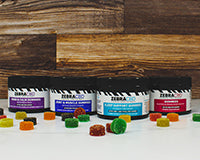
Itchy eyes, runny nose and sore throat — these are everyday realities for people living with seasonal allergies. As pollen counts continue to rise each year, it’s no wonder why people with seasonal sniffles will do just about anything to find relief from their allergic symptoms.
When your pollen allergies threaten to take over your life, you might wonder: Can you use CBD for allergies?
While there’s no scientific research to suggest that CBD is a treatment (or a cure) for the root cause of seasonal allergies, CBD could provide relief from some of the symptoms you might experience during allergy season. In fact, there’s growing evidence that suggests that CBD might support healthy sleep, relieve physical discomfort and impact mood — all of which are relevant when living with seasonal allergies.
In this guide, we’re breaking down the current scientific evidence to help you learn more about the connection between CBD and seasonal allergy relief. We’ll also provide tips for incorporating CBD into your routine should you choose to do so.
What Are Seasonal Allergies?
Seasonal allergies — sometimes called allergic rhinitis or hay fever — aren’t very different from other types of allergies. Here’s a quick breakdown of how allergies work:
- A harmless substance enters your body (pollen, for instance).
- Although it’s harmless, your immune system incorrectly identifies the substance as harmful.
- The immune system responds by attacking the substance and producing a wide variety of symptoms — an “allergic reaction.”
For people with seasonal allergies, the allergen that triggers an allergic reaction is typically pollen. Trees, flowers, weeds and other plant life release pollen to reproduce. And, while some plants only flower (i.e., release pollen) during the warm months, many bloom year-round. So, the amount of pollen in the air can vary based on geographic location, seasonal changes and other environmental factors.
Common symptoms of seasonal allergies can include:
- Sore throat
- Runny nose
- Congestion and difficulty breathing
- Skin irritation
- Headache
- Swollen, red or watery eyes
If you experience any of the above symptoms during “allergy season” (the time of year when pollen counts are generally highest), you’re not alone. The CDC believes that at least 60 million people in the US experience seasonal allergies.
Is There a Cure for Seasonal Allergies?
While there currently isn’t a “cure” for seasonal allergies, there are a variety of options for allergy symptom management. These options fall into two major categories:
- Medical treatment – Doctors may prescribe medication for seasonal allergy management. In some cases, they may even recommend allergy shots — regular allergen exposure that helps patients build immunity and decrease their allergic response. However, allergy shots can take years to become effective, and they’re not the right solution for everyone.
- Over-the-counter medications – Many people treat their allergic symptoms with medications like antihistamines, corticosteroids, decongestants or non-steroidal anti-inflammatory drugs (NSAIDs) like Aleve. These provide varying degrees of temporary allergy relief, and they can be purchased at most pharmacies.
Some people may even use a combination of both of these options to try to manage seasonal allergies.
What Is CBD?
Cannabidiol (CBD) is a cannabinoid found in the Cannabis sativa (marijuana) plant. A cannabinoid is a naturally occurring compound, and there are numerous cannabinoids found in various strains of the marijuana plant.
In many cases, cannabinoids like CBD interact with the human body’s endocannabinoid system (ECS), a network of receptors and pathways that’s been a topic of intense scientific study in the last decade. Researchers are intently exploring the ways that various cannabinoids (like THC and CBD) interact with the ECS.
Here are a few key things to know about CBD:
- It’s not psychoactive – Unlike its sibling cannabinoid THC, CBD does not produce intoxicating effects. In other words, you can’t get high using CBD.
- It’s federally legal – Federally speaking, it’s legal to buy, possess and use CBD products. However, some states have enacted CBD-related policies. You should review these carefully before purchasing any products.
- It’s widely available – There are a wide variety of CBD products on the market today: smokeable flower, topical creams and edible gummies are just a few examples. You can even purchase CBD online.
CBD vs. Hemp
If you’ve seen CBD hemp oil for sale online, you might be wondering: What’s the difference between CBD, hemp and marijuana? While some people use these terms interchangeably, they’re slightly different:
- Hemp is a specific species of the Cannabis sativa plant that contains less than 0.3% of THC content.
- Marijuana is another name for Cannabis sativa — a plant that produces flowering buds.
- CBD is one of many cannabinoids found in the Cannabis sativa plant.
Can CBD Provide Relief from Seasonal Allergies?
With an understanding of both CBD and seasonal allergies, we can start exploring our central question: Can you use CBD for allergies to pollen and other environmental triggers?
The answer is maybe.
While there’s currently no scientific evidence to support that CBD can alleviate the root cause of seasonal allergies (an immune response to pollen), you might consider using CBD products to relieve some of your symptoms and support a healthy lifestyle.
In other words, CBD won’t keep your immune system from incorrectly identifying pollen as harmful. However, since CBD could support healthy sleep, potentially relieve some physical discomfort and perhaps impact your mood, you could use it to get adequate rest, soothe aches or keep your spirits up during allergy season.
How Could CBD Help Support a Healthy Lifestyle During Allergy Season?
With the above in mind, let’s break down some potential applications for CBD use during allergy season — the ways you might incorporate CBD into your lifestyle to support your overall health and wellness when pollen counts are high.
CBD Could Support Healthy Sleep
Like other cannabis-related research, there isn’t an overwhelming body of evidence related to CBD and sleep — current knowledge is based on just a few studies, but the early results are promising.
In some studies, CBD has helped patients:
- Fall asleep
- Stay asleep
- Get more restful sleep
But cannabinoids like CBD can impact people in different ways. Some studies found that CBD might be stimulating instead of sleep-inducing for some people.
How is sleep related to seasonal allergies? Anyone who’s ever had a common cold or upper respiratory discomfort knows that, when your nose is running and your throat is sore, it can be difficult to fall asleep. If your seasonal allergy symptoms are making it hard to fall asleep or sleep through the night, CBD could help promote a healthy sleep cycle.
CBD Could Relieve Physical Discomfort
While more research is needed, early findings suggest that CBD could help soothe physical aches and discomfort. A CBD topical, for instance, might help with muscle soreness after a long workout. Additionally, research has shown the potential benefit of CBD for inflammation reduction.
But there are a few things to note about CBD and physical discomfort:
- Evidence is still limited – There are only a handful of studies that discuss whether or not CBD can effectively provide relief. Most importantly, there aren’t enough studies on healthy, human participants to clearly demonstrate effectiveness.
- Application methods can impact experience – If you’re considering trying CBD, experiment with different administration methods to find one that produces the results you’re looking for. Consider CBD edibles, topicals, tinctures and other products in a variety of concentrations. The CBD product you’re using can significantly impact your experience.
Whether your sides hurt from coughing so much or your throat has been scratchy for days on end, the full-body symptoms of seasonal allergies can be difficult to manage. With CBD, you may be able to alleviate some discomfort caused by these symptoms.
CBD Could Impact Mood
Seasonal allergies can touch nearly every aspect of your life:
- Your social life – When pollen counts are high, you might choose to stay home and potentially miss out on social events.
- Your sleep – Allergy-related sleep issues might leave you feeling groggy or sluggish.
- Your routine – Keeping track of your over-the-counter medications and making sure you have easy access to tissues and eye drops during allergy season can throw a wrench in everyday habits and hobbies like exercising, meditating or traveling.
With all of these disruptions, you might feel low, agitated or angry during allergy season.
Fortunately, there’s some promising evidence that CBD could help support a healthy mood. While we still need more data to determine how CBD impacts healthy people and people with seasonal allergies, preliminary data suggests that CBD could promote a calmer disposition.
Incorporating CBD Into Your Routine
If you’re interested in discovering potential CBD oil benefits, there are a few ways to incorporate it into your routine. Here are a few helpful tips for CBD newcomers:
- Find a product you like – Whether you find CBD gummies for sale or stick to topical creams, there are loads of CBD products to choose from. Experiment with CBD product type, concentration and amounts until you achieve the results you want.
- Set a routine – If you’re looking to achieve wellness benefits with CBD, consistency is key to tracking your progress. Try to take CBD at similar times of the day; you can use your phone’s calendar or alarm clock to help you stay on track, whether it becomes part of your healthy morning routine to get the day started or night routine to help yourself unwind.
- Record your results – To keep track of which products, concentrations and amounts you liked or disliked, consider keeping a journal about your experiences using CBD. This will help you choose the best products for you throughout your journey.
Zebra CBD: Premium CBD for Health & Vitality During Allergy Season
So, can you use CBD for allergies? While scientists don’t know whether or not CBD impacts allergic responses, there’s evidence to suggest that it could support healthy sleep, relieve discomfort and benefit your mood — all of which are key to staying well during allergy season.
When you need a CBD source you can trust, turn to Zebra CBD. All of our premium CBD products are third-party lab-tested so that you can use our formulas with absolute confidence.
Check out our inventory of CBD products to start exploring potential health benefits today.
Sources:
- National Center for Complementary and Integrative Health. Seasonal Allergies at a Glance. https://www.nccih.nih.gov/health/seasonal-allergies-at-a-glance
- CNN. Your Pollen Allergies Are Overwhelming? This Might Be Why. https://www.cnn.com/2023/03/08/health/allergy-season-early-pollen-wellness-climate/index.html
- Centers for Disease Control and Prevention. Allergens and Pollen. https://www.cdc.gov/climateandhealth/effects/allergen.htm
- Mayo Clinic. Allergy Shots. https://www.mayoclinic.org/tests-procedures/allergy-shots/about/pac-20392876
- Centers for Disease Control and Prevention. CBD: What You Need to Know. https://www.cdc.gov/marijuana/featured-topics/CBD.html
- National Center for Complementary and Integrative Health. Cannabis (Marijuana) and Cannabinoids: What You Need to Know. https://www.nccih.nih.gov/health/cannabis-marijuana-and-cannabinoids-what-you-need-to-know
- Harvard University. The Endocannabinoid System: Essential and Mysterious. https://www.health.harvard.edu/blog/the-endocannabinoid-system-essential-and-mysterious-202108112569
- PBS. Is CBD Legal? Here’s What You Need to Know, According to Science. https://www.pbs.org/newshour/science/is-cbd-legal-heres-what-you-need-to-know-according-to-science
- Colorado Department of Agriculture. Colorado Hemp Program. https://ag.colorado.gov/plants/hemp
- Sleep Foundation. CBD As a Sleep Aid. https://www.sleepfoundation.org/sleep-aids/cbd-for-sleep
- Harvard University. Cannabidiol (CBD): What We Know and What We Don’t. https://www.health.harvard.edu/blog/cannabidiol-cbd-what-we-know-and-what-we-dont-2018082414476
- The New York Times. What Are the Benefits of CBD?. https://www.nytimes.com/2019/10/16/style/self-care/cbd-oil-benefits.html









